

FAQS. Learn more about our evaluation services by clicking the question of interest to you.
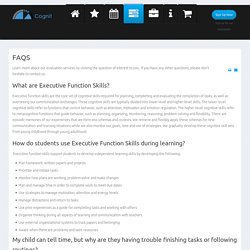
If you have any other questions, please don't hesitate to contact us. What are Executive Function Skills? Executive function skills are the core set of cognitive skills required for planning, completing and evaluating the completion of tasks, as well as overseeing our communication exchanges. These cognitive skills are typically divided into lower level and higher-level skills. The lower level cognitive skills refer to functions that control behavior, such as attention, motivation and emotion regulation. Executive Function. Promoting Executive Function in the Classroom. Surina Basho Character traits such as grit, resilience and self-control are enjoying a renaissance in public and private schools as educators look at noncognitive skills that may help prepare students to become successful lifelong learners.
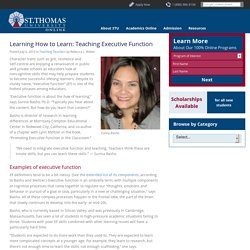
Despite its clunky name, “executive function” (EF) is one of the hottest phrases among educators. “Executive function is about the how of learning,” says Surina Basho, Ph.D. “Typically you hear about the content. But how do you learn that content?” Basho is director of research in learning differences at Morrissey-Compton Educational Center in Redwood City, California, and co-author of a chapter with Lynn Meltzer in the book, “Promoting Executive Function in the Classroom.” “We need to integrate executive function and teaching.
Examples of executive function EF definitions tend to be a bit messy. “Students are expected to do more work than they used to. Similarly, there’s less external structure provided in high school, and even less in college. Beat the system, win the game: Response to Mooney and Cole’s Learning Outside the Lines. In their hybrid memoir/self-help book, Learning Outside the Lines: Two Ivy League Students with Learning Disabilities and ADHD Give you the Tools for Academic Success and Educational Revolution (2000), Jonathan Mooney and David Cole reflect on their experiences as LD/ADHD students who endured educational failure and went on to succeed in the Ivy Leagues, not by conforming to the mold of traditional education, but by accepting their unique strengths as atypical learners and beating the academic game.
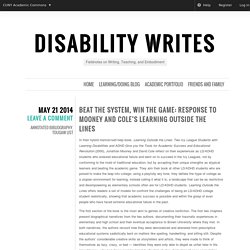
They aim their book at other LD/ADHD students who are poised to make the leap into college; using a playfully wry tone, they deflate the hype of college as a utopian environment for learning, instead calling it what it is, a landscape that can be as restrictive and disempowering as elementary schools often are for LD/ADHD students. The first section of the book is the most akin to genres of creative nonfiction. 1. 2. Understand individual strengths and weaknesses 3. 4. Learning Outside The Lines: Two Ivy League Students with Learning Disabilities and ADHD Give You the Tools for Academic Success and Educational Revolution: Edward M. Hallowell, Jonathan Mooney, David Cole: 9780684865980: Amazon.com: Books. Judy Willis MD. Dr.

Willis, with her background as a neurologist and classroom teacher, is an authority on brain research regarding learning and the brain and correlations of this research to best teaching practices. After graduating Phi Beta Kappa as the first woman graduate from Williams College, Judy Willis attended UCLA School of Medicine where she was awarded her medical degree. She remained at UCLA and completed a medical residency and neurology residency, including chief residency.
She practiced neurology for fifteen years before returning to university to obtain her Teaching Credential and Masters of Education from the University of California, Santa Barbara. The Family Coach Method. Dr.

Lynne Kenney, author of The Family Coach Method, is a BIG FAN of SPARK. A graduate of our K-2 training curriculum, Lynne is an advocate for SPARK in schools. As a pediatric psychologist she knows the value of exercise and nutrition in the lives of families. Pediatric Psychology - Multimedia Parenting - Dr. Lynne Kenney. Fostering Independent Learning: Practical Strategies to Promote Student Success. Home » Education » Educational Psychology Fostering Independent LearningPractical Strategies to Promote Student SuccessVirginia Smith Harvey and Louise A.
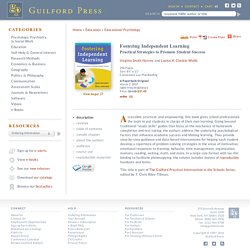
Chickie-Wolfe 256 Pages Size: 8½" x 11" Executive function: a new lens for viewing your child. As each of us goes about daily life, numerous mental processes and skills help us plan for — and respond to — the tasks, challenges, and opportunities we face.
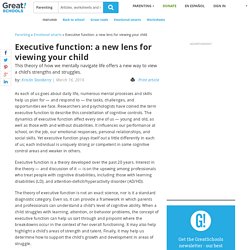
Researchers and psychologists have coined the term executive function to describe this constellation of cognitive controls. The dynamics of executive function affect every one of us — young and old, as well as those with and without disabilities. Think:Kids – Collaborative Problem Solving. Amazon. Amazon. Lives in the Balance and Dr. Greene's approach. Raising a Thinking Preteen. 7 Things Your Teenager Won't Tell You: And How to Talk About Them Anyway: Jenifer Marshall Lippincott, Robin M. Deutsch: 9780812969597: Amazon.com: Books. 2 25 Executive Functioning Handout. Home - Tools of the Mind. Bodrova Leong 2007 pp1 91. Drs. Peg Dawson and Richard Guare: Executive Skills Approach to Helping Kids Reach Their Potential. DRB 121 Executive Function Sample Chapter. Executive Skills in Children and Adolescents: Second Edition: A Practical Guide to Assessment and Intervention.
“This is an exceptionally useful book which I highly recommend.”

—Schooldays Magazine “This is a rich and practical resource for all those working with children, including educators, therapists, and psychologists. Dr. Adam Cox - Psychologist, Education Consultant, Youth.